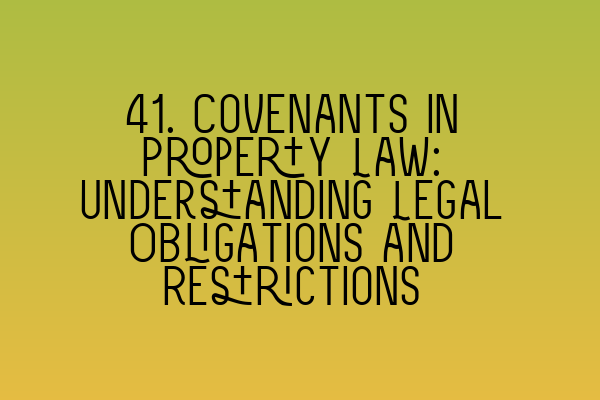41. Covenants in Property Law: Understanding Legal Obligations and Restrictions
In property law, covenants play a crucial role in defining the legal obligations and restrictions associated with a property. Whether you are a buyer, seller, or simply interested in property law, understanding covenants is essential to navigate the complexities of real estate transactions. In this article, we will delve into the intricacies of covenants in property law, their types, and their implications.
What is a Covenant?
Simply put, a covenant is a legally binding agreement or promise that imposes obligations and restrictions on the parties involved. In the context of property law, covenants are typically written into deeds or contracts and govern the use, maintenance, and rights associated with a property. These covenants are designed to protect the interests of both the property owner and the surrounding community.
Types of Covenants
1. Affirmative Covenants: Affirmative covenants require the property owner to take specific actions or perform certain duties. For example, an affirmative covenant might stipulate that the property owner needs to maintain the property in good repair or pay an annual fee to a homeowners association for the maintenance of common areas.
2. Restrictive Covenants: Restrictive covenants, on the other hand, place limitations on the use and development of the property. These covenants are often found in neighborhoods or communities with shared amenities, such as gated communities or condominium complexes. Restrictive covenants could prohibit certain activities, such as running a home-based business or making structural modifications without prior consent.
Enforceability of Covenants
Covenants in property law are generally enforceable under the principle of privity of contract. Privity of contract refers to the legal relationship between the parties to a contract, allowing them to enforce and be bound by its terms. However, there are some important considerations to keep in mind regarding the enforceability of covenants.
1. Horizontal Privity: In order for a restrictive covenant to be enforceable, there must be horizontal privity, which means that the covenant is contained in a document that is part of the chain of title of the affected properties. Without horizontal privity, subsequent property owners may not be bound by the covenant.
2. Vertical Privity: Vertical privity refers to the legal relationship between the original parties to the covenant and subsequent property owners. For a restrictive covenant to be enforceable against a subsequent owner, there must be vertical privity, which can be established through a written agreement or conveyance.
Implications and Considerations
When entering into a property transaction, it is crucial to be aware of any existing covenants that may impact your rights and obligations as the property owner. Failure to comply with the terms of a covenant may result in legal consequences, such as lawsuits, injunctions, or monetary damages.
If you are considering purchasing a property, it is highly recommended to conduct a thorough due diligence process to identify any existing covenants that may impact your intended use of the property. This may include reviewiing title documents, conducting a survey, and consulting with legal professionals specializing in property law.
Conclusion
Covenants are an integral part of property law, helping to maintain property values, ensure harmonious living within communities, and protect the interests of both property owners and the surrounding area. Understanding the different types of covenants and their implications is essential for anyone involved in real estate transactions.
If you are preparing for the SQE 1 or SQE 2 exams and would like to test your knowledge on property law, we recommend checking out our related articles on SQE exam preparation and practice exams. Our SQE 1 practice exam questions and SQE 1 and SQE 2 preparation courses can help you effectively prepare for the exams and boost your chances of success.
For information on upcoming SQE exam dates or to find out more about our comprehensive SQE preparation courses, visit our website. We are dedicated to providing aspiring solicitors with the resources and support they need to succeed in their legal careers.
[Link to related article on SQE 1 Practice Exam Questions](https://fqps.co.uk/sqe/sqe1-preparation/mcq-practice-quiz)
[Link to related article on SQE 1 Practice Mocks FLK1 FLK2](https://fqps.co.uk/sqe/sqe1-preparation/practice-mocks-quiz)
[Link to related article on SQE 2 Preparation Courses](https://fqps.co.uk/sqe/sqe2-preparation)
[Link to related article on SQE 1 Preparation Courses](https://fqps.co.uk/sqe/sqe1-preparation)
[Link to related article on SRA SQE Exam Dates](https://fqps.co.uk/sqe/sqe1-sqe2-exam-dates)
